We just learned that Manfred Krug (1937-2016) passed away on 21 October. To honour this great German actor, who was often cast as a socialist hero in DEFA films of the former GDR, we repost his EFSP bio. Krug was multi-talented and also became known in East Germany as a jazz singer. In 1977, he returned to West Germany, where he became a popular TV star. Mr. Krug, rest in peace.
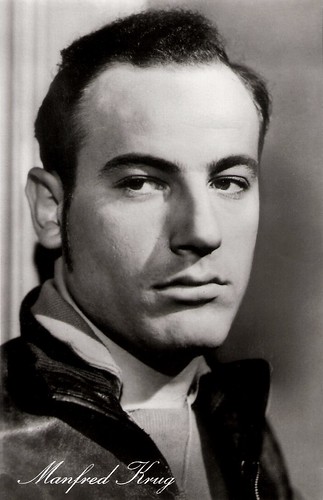
East-German postcard by VEB Progress Filmvertrieb, no. 966, 1959. Retail price: 0,20 DM. Photo: DEFA / Dassdorf. Publicity still for Reportage 57 (János Veiczi, 1959).
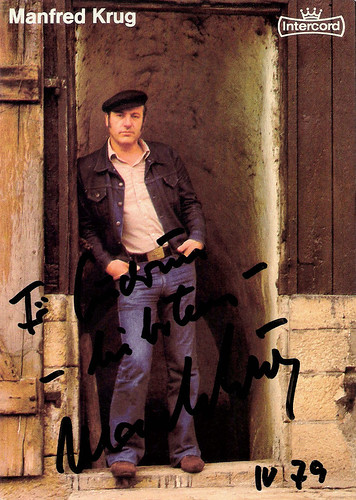
German promotion card by Intercord, Stuttgart, 1979.
Manfred Krug was born in 1937 in Duisburg, Germany. His parents were Rudolf and Alma Krug. In 1949, after the divorce of his parents, the 13-year-old Manfred moved with his father from Duisburg to the newly founded German Democratic Republic (GDR). The young Krug trained as a steel smelter in Brandenburg an der Havel. A splash of liquid steel caused a distinctive scar on his forehead. Krug worked for four years in a steel plant and rolling mill. In the evenings he studied and decided to go to drama school. From 1955 to 1957 he was an apprentice at Bertolt Brecht's Berliner Ensemble. In 1957, Krug made his film debut as a guitarist in Die Schönste/The Most Beautiful (Ernesto Remani, Walter Beck, 1957).
Filmportal.de: “Because of his strong build, his powerful body language, and his rebellious presence, Krug mainly played roles of villains and young rowdies in the early years of his movie career.” He played a smuggler in the crime film Ware für Katalonien/Goods For Catalonia (Richard Groschopp, 1959), based on a true fraud: a criminal sold the entire stock of optical instruments produced by the Zeiss factory in Jena, East Germany, to the Spanish Army and to customers in Barcelona. Krug also appeared in the successful war film Fünf Patronenhülsen/Five Cartridges (Frank Beyer, 1960) opposite Erwin Geschonneck and Armin Mueller-Stahl. During the Spanish Civil War, a battalion of the International Brigades is cut off without water or ammunition. Five Cartridges won director Frank Beyer great acclaim, and also for Krug, many more film roles followed. He also achieved notability as a jazz singer.
He appeared in the drama Professor Mamlock (Konrad Wolf, 1961) about a Jewish surgeon (Wolfgang Heinz) in Germany in the early 1930s. It was based on the play Professor Mamlock, written by the director's father Friedrich Wolf during 1933, when he was in exile in France. Krug was often cast as the tough guy with a heart of gold, such as in Auf der Sonnenseite/On the Sunny Side (Ralf Kirsten, 1962). In this musical comedy, he starred as a steel smelter and an amateur actor and jazz singer, who is sent to a drama school by his factory's committee. The film's script was largely inspired by Krug's biography: he worked in a steel factory before turning to an acting career. His jazz band and his singing career were also a central theme in the plot.
DEFA historian Dagmar Schittly notes that Auf der Sonnenseite was the most popular East German film of the early 1960s, and Krug and the collective crew were awarded the Heinrich Greif Prize for their work. Krug managed to give the Communist system a human face and credibility. Krug and director Kirsten reunited for the historical adventure Mir nach, Canaillen!/Follow Me, Scoundrels (Ralf Kirsten, 1964). Two years later Krug starred in Spur der Steine/Trace of Stones (Frank Beyer, 1966). After its release, the film was shown only for a few days, before being shelved due to conflicts with the Socialist Unity Party, the ruling communist party in the GDR. Krug’s portrayal of a rebellious and brash building site brigadier was deemed as too ‘anarchic’ by the censors.
Filmportal.de: “Indeed, the role of the aggressive, yet down-to-earth worker who defies authority and often kicks over the traces has always been one of Krug's main roles.” Only after 23 years was the film shown again, in 1989, when the Berlin Wall fell. His other DEFA-films include Die Fahne von Kriwoj Rog/The Banner of Krivoi Rog (Kurt Maetzig, 1967) starring Erwin Geschonneck, and the contemporary Eastern road movie Weite Straßen – stille Liebe/ Wide streets, silent love (Herrmann Zschoche, 1969) with Jaecki Schwarz, which made Krug a favourite among East-German teenage filmgoers.
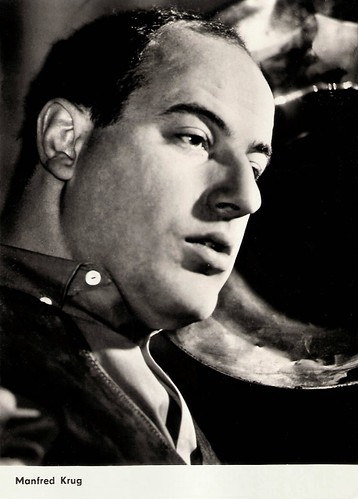
East-German postcard by VEB Progress Filmvertrieb, no. 1.819, 1963. Retail price: 0,20 DM. Photo: Klaus Fischer. Publicity still for Revue um Mitternacht/Midnight Review (Gottfried Kolditz, 1962).
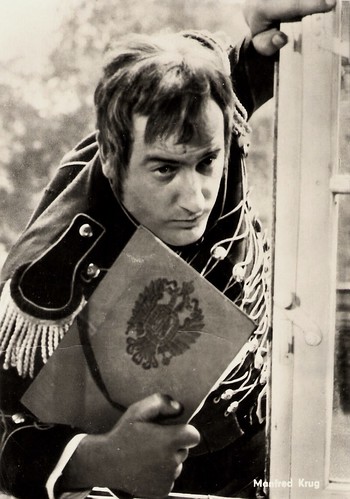
East-German postcard by VEB Progress Filmvertrieb, no. 88/69. Photo: DEFA / Wenzel. Publicity still for Hauptmann Florian von der Mühle/Captain Florian of the Mill (Werner W. Wallroth, 1968).
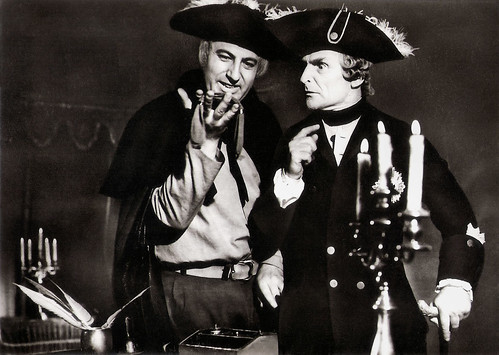
East-German postcard by VEB Bild und Heimat Reichenbach i.V., no. AG 500/12/72. Photo: DEFA / Kroiss. Publicity still for Die gestohlene Schlacht/The stolen battle (Erwin Stranka, 1972) with Herwart Grosse.
In 1976 Manfred Krug participated in protests against the expulsion and stripping of GDR citizenship of singer-songwriter Wolf Biermann. Suddenly the popular Krug, who had won numerous awards in the years before (among them the National Award and the Medal for Merit of the GDR), was subjected to sanctions and censorship. The situation escalated when Krug beat down a Stasi informer who had insulted and defamed him publicly.
After six months of partial unemployment, Krug requested to leave the GDR in 1977. As soon as he got the approval he left East Germany and moved to Schöneberg in West Berlin. Twenty years later, he wrote about these events in his book 'Abgehauen' (1997, Pushed off). This memoir became a bestseller and it was filmed by Frank Beyer in 1998.
After moving back to West Germany, Manfred Krug very soon got new roles. In 1978 he appeared as the adventurous truck driver Franz Meersdonk in the TV series Auf Achse/On the Axis. He continued to play in the series until 1995, one year before the show ended its long run. Krug's various television roles even included a two-year stint on the children's program Sesamstraße (1982-1984), the German version of the American children's program Sesame Street.
He was very popular as an attorney in the Berlin-based comedic attorney TV series Liebling Kreuzberg/Darling Kreuzberg (1986-1998). From 1984 to 2001, he also starred as Hamburg-based commissioner Paul Stoever in the Krimi series Tatort, which would eventually run for a total of 41 instalments.
His later feature films include the comedy Neuner (Werner Masten, 1990), and the political drama Der Blaue/The Blue One (Lienhard Wawrzyn, 1994), which was entered into the 44th Berlin International Film Festival. In 2005, his second memoir, 'Mein schönes Leben' (2005, My Beautiful Life), became another bestseller. Since 1963, Manfred Krug was married to Ottilie Krug. Together they had three children, including the singer Fanny Krug. In 2002 it was announced that Krug also had an illegitimate child. He died on 21 October 2016 in Berlin.

East German collector card in the 'Neu im Kino' series by VEB Progress Film-Vertrieb, Berlin, no. 500/6/68. Manfred Krug in Hauptmann Florian von der Mühle/Captain Florian of the Mill (Werner W. Wallroth, 1968).
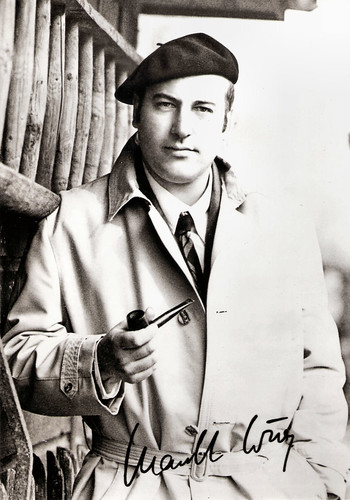
Big East-German card by VEB Progress Filmvertrieb, no. 155/70, 1970. Retail price: 0,20 DM. Photo: Linke.
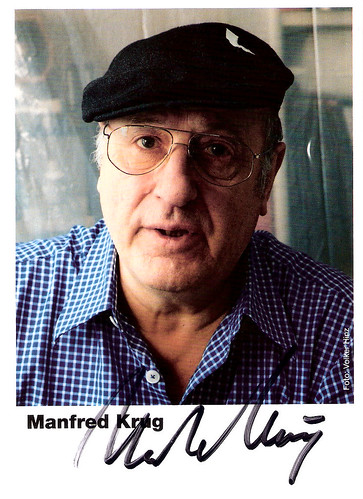
German promotion card by kv-events.de. Photo: Volker Hinz.
Trailer Spur der Steine/Trace of Stones (1966). Sorry, no subtitles. Source: DEFA-Stiftung (YouTube).
Sources: Filmportal.de, AllMovie (Page now defunct), Wikipedia (English and German) and IMDb.
This post was last updated on 26 January 2025.

East-German postcard by VEB Progress Filmvertrieb, no. 966, 1959. Retail price: 0,20 DM. Photo: DEFA / Dassdorf. Publicity still for Reportage 57 (János Veiczi, 1959).

German promotion card by Intercord, Stuttgart, 1979.
Powerful body language and rebellious presence
Manfred Krug was born in 1937 in Duisburg, Germany. His parents were Rudolf and Alma Krug. In 1949, after the divorce of his parents, the 13-year-old Manfred moved with his father from Duisburg to the newly founded German Democratic Republic (GDR). The young Krug trained as a steel smelter in Brandenburg an der Havel. A splash of liquid steel caused a distinctive scar on his forehead. Krug worked for four years in a steel plant and rolling mill. In the evenings he studied and decided to go to drama school. From 1955 to 1957 he was an apprentice at Bertolt Brecht's Berliner Ensemble. In 1957, Krug made his film debut as a guitarist in Die Schönste/The Most Beautiful (Ernesto Remani, Walter Beck, 1957).
Filmportal.de: “Because of his strong build, his powerful body language, and his rebellious presence, Krug mainly played roles of villains and young rowdies in the early years of his movie career.” He played a smuggler in the crime film Ware für Katalonien/Goods For Catalonia (Richard Groschopp, 1959), based on a true fraud: a criminal sold the entire stock of optical instruments produced by the Zeiss factory in Jena, East Germany, to the Spanish Army and to customers in Barcelona. Krug also appeared in the successful war film Fünf Patronenhülsen/Five Cartridges (Frank Beyer, 1960) opposite Erwin Geschonneck and Armin Mueller-Stahl. During the Spanish Civil War, a battalion of the International Brigades is cut off without water or ammunition. Five Cartridges won director Frank Beyer great acclaim, and also for Krug, many more film roles followed. He also achieved notability as a jazz singer.
He appeared in the drama Professor Mamlock (Konrad Wolf, 1961) about a Jewish surgeon (Wolfgang Heinz) in Germany in the early 1930s. It was based on the play Professor Mamlock, written by the director's father Friedrich Wolf during 1933, when he was in exile in France. Krug was often cast as the tough guy with a heart of gold, such as in Auf der Sonnenseite/On the Sunny Side (Ralf Kirsten, 1962). In this musical comedy, he starred as a steel smelter and an amateur actor and jazz singer, who is sent to a drama school by his factory's committee. The film's script was largely inspired by Krug's biography: he worked in a steel factory before turning to an acting career. His jazz band and his singing career were also a central theme in the plot.
DEFA historian Dagmar Schittly notes that Auf der Sonnenseite was the most popular East German film of the early 1960s, and Krug and the collective crew were awarded the Heinrich Greif Prize for their work. Krug managed to give the Communist system a human face and credibility. Krug and director Kirsten reunited for the historical adventure Mir nach, Canaillen!/Follow Me, Scoundrels (Ralf Kirsten, 1964). Two years later Krug starred in Spur der Steine/Trace of Stones (Frank Beyer, 1966). After its release, the film was shown only for a few days, before being shelved due to conflicts with the Socialist Unity Party, the ruling communist party in the GDR. Krug’s portrayal of a rebellious and brash building site brigadier was deemed as too ‘anarchic’ by the censors.
Filmportal.de: “Indeed, the role of the aggressive, yet down-to-earth worker who defies authority and often kicks over the traces has always been one of Krug's main roles.” Only after 23 years was the film shown again, in 1989, when the Berlin Wall fell. His other DEFA-films include Die Fahne von Kriwoj Rog/The Banner of Krivoi Rog (Kurt Maetzig, 1967) starring Erwin Geschonneck, and the contemporary Eastern road movie Weite Straßen – stille Liebe/ Wide streets, silent love (Herrmann Zschoche, 1969) with Jaecki Schwarz, which made Krug a favourite among East-German teenage filmgoers.

East-German postcard by VEB Progress Filmvertrieb, no. 1.819, 1963. Retail price: 0,20 DM. Photo: Klaus Fischer. Publicity still for Revue um Mitternacht/Midnight Review (Gottfried Kolditz, 1962).

East-German postcard by VEB Progress Filmvertrieb, no. 88/69. Photo: DEFA / Wenzel. Publicity still for Hauptmann Florian von der Mühle/Captain Florian of the Mill (Werner W. Wallroth, 1968).

East-German postcard by VEB Bild und Heimat Reichenbach i.V., no. AG 500/12/72. Photo: DEFA / Kroiss. Publicity still for Die gestohlene Schlacht/The stolen battle (Erwin Stranka, 1972) with Herwart Grosse.
Pushed off
In 1976 Manfred Krug participated in protests against the expulsion and stripping of GDR citizenship of singer-songwriter Wolf Biermann. Suddenly the popular Krug, who had won numerous awards in the years before (among them the National Award and the Medal for Merit of the GDR), was subjected to sanctions and censorship. The situation escalated when Krug beat down a Stasi informer who had insulted and defamed him publicly.
After six months of partial unemployment, Krug requested to leave the GDR in 1977. As soon as he got the approval he left East Germany and moved to Schöneberg in West Berlin. Twenty years later, he wrote about these events in his book 'Abgehauen' (1997, Pushed off). This memoir became a bestseller and it was filmed by Frank Beyer in 1998.
After moving back to West Germany, Manfred Krug very soon got new roles. In 1978 he appeared as the adventurous truck driver Franz Meersdonk in the TV series Auf Achse/On the Axis. He continued to play in the series until 1995, one year before the show ended its long run. Krug's various television roles even included a two-year stint on the children's program Sesamstraße (1982-1984), the German version of the American children's program Sesame Street.
He was very popular as an attorney in the Berlin-based comedic attorney TV series Liebling Kreuzberg/Darling Kreuzberg (1986-1998). From 1984 to 2001, he also starred as Hamburg-based commissioner Paul Stoever in the Krimi series Tatort, which would eventually run for a total of 41 instalments.
His later feature films include the comedy Neuner (Werner Masten, 1990), and the political drama Der Blaue/The Blue One (Lienhard Wawrzyn, 1994), which was entered into the 44th Berlin International Film Festival. In 2005, his second memoir, 'Mein schönes Leben' (2005, My Beautiful Life), became another bestseller. Since 1963, Manfred Krug was married to Ottilie Krug. Together they had three children, including the singer Fanny Krug. In 2002 it was announced that Krug also had an illegitimate child. He died on 21 October 2016 in Berlin.

East German collector card in the 'Neu im Kino' series by VEB Progress Film-Vertrieb, Berlin, no. 500/6/68. Manfred Krug in Hauptmann Florian von der Mühle/Captain Florian of the Mill (Werner W. Wallroth, 1968).

Big East-German card by VEB Progress Filmvertrieb, no. 155/70, 1970. Retail price: 0,20 DM. Photo: Linke.

German promotion card by kv-events.de. Photo: Volker Hinz.
Trailer Spur der Steine/Trace of Stones (1966). Sorry, no subtitles. Source: DEFA-Stiftung (YouTube).
Sources: Filmportal.de, AllMovie (Page now defunct), Wikipedia (English and German) and IMDb.
This post was last updated on 26 January 2025.
No comments:
Post a Comment